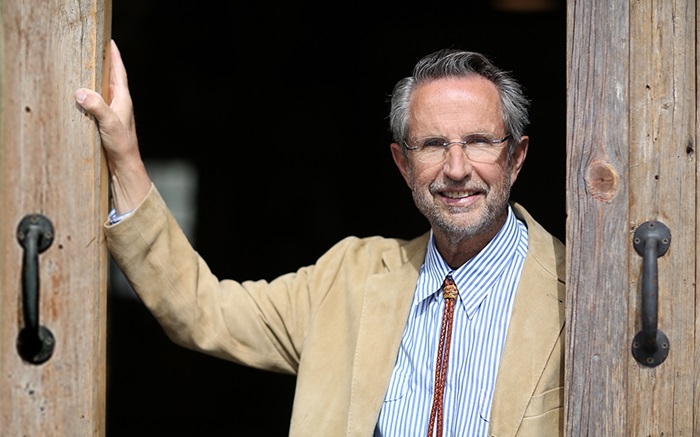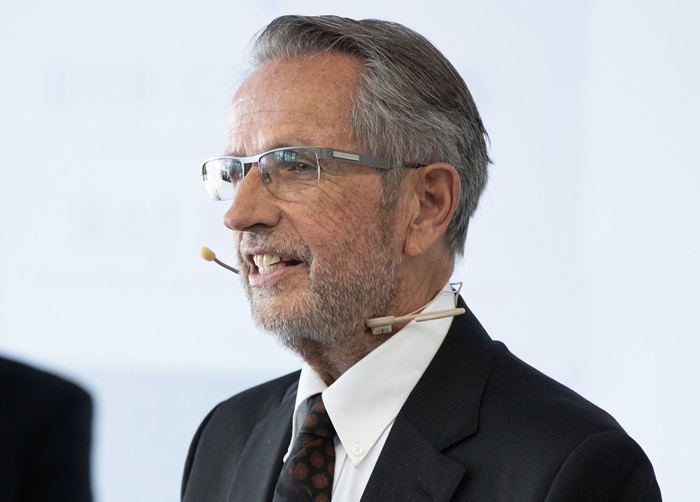The Power of Listening as Leaders
By Bob Chapman | July 18, 2024 4:32 pm
Barry-Wehmiller CEO on why listening is not only an effective leadership tool but a crucial human need.

In a conversation five or six years ago, someone shared an astounding statistic that still motivates me.
She told me that a major health organization shared that the person you report to at work can be more important to your health than your family doctor.
It was almost an unbelievable thing to hear. How could that be?
We tracked down the source of the statement to interview for our Truly Human Leadership Podcast. It came from the research of Dr. Casey Chosewood, the Director of the Office for Total Worker Health at the National Institute for Occupational Safety and Health, part of the Centers for Disease Control and Prevention.
He said, “I think it’s one of those kinds of statements that really stop and make you think about how important the exposure of work is to your overall day-to-day and long-term health and well-being. … Many folks see their doctor maybe once or twice a year, perhaps less frequently for a full physical or a full evaluation of their overall well-being. That certainly was true when I practiced family medicine for more than a decade. I would see patients once a year or a few times a year, and it was quite frustratingly limited how much actual influence I could have on their overall health, especially when you compare the influence that the exposure of work itself, which we know is a huge social determinant of our health.
As recently as last year, a Forbes article cited new data that said for almost 70% of people, their manager has more impact on their mental health than their therapist or their doctor — and it’s equal to the impact of their partner.
One of the profound truths we’ve discovered at Barry-Wehmiller is this: The way we lead impacts the way people live.
Most leaders understand their influence on team members’ lives during work hours, but, often enough, they don’t think about how their leadership affects team members outside the workplace as well.
And one of the most significant ways leaders can impact the lives of those within their span of care is through one important skill: listening.
Listening is the most important thing a leader can do. But it transcends the leader role. Listening is the most important thing we, as humans, can do for one another. It shows empathy, it shows you care and, most importantly, it shows the person you are listening to that they matter.
In Chapman & Co. Leadership Institute — Barry-Wehmiller’s consulting arm that specializes in helping other companies identify, develop and equip their leaders — communication skills or listening training is one of the fundamental offerings they bring to other businesses.
“There is significant demand from organizations who have identified gaps in their leaders’ ability to listen effectively,” says Sara Hannah, managing partner for Chapman & Co. “When we ask clients what they would like to see more of in their leaders, effective communication is the most consistent response. While a premium is placed on a leader’s ability to speak effectively early in their career, as their span of care grows, a premium is placed on listening.”
Here’s an example of the power of listening for leaders that not only made an impact on the business, but on a team member’s home life as well.
Steve was a team member in one of our BW Converting businesses, Paper Converting Machine Company, in Green Bay, Wisc. Many years ago, I was visiting the facility and, on the suggestion of one of the leaders, I invited a group of our team members into a meeting to give a report about a project that led to significant performance improvements.
The team shared all the usual metrics, but when they were finished, I asked Steve, whom I’d never met before, a simple question that just popped into my head: “Steve, how did it affect your life?”
This group wasn’t prepared to walk in and speak in front of all our presidents, but without missing a beat, Steve said: “My wife now talks to me more.”
It was unrehearsed, it was spontaneous, and it was the truth. He said, “Do you know what it’s like, Bob, to work in a place where you show up every morning, you punch a card, you go to your station, you’re told what to do, you’re not given the tools you need to do what you need to do, you get ten things right and nobody says a word, and you get one thing wrong and you get chewed out? You ask questions and it takes a week to get an answer back. They complain about your salary or your benefits. Do you know what it feels like to go home at night to your family? You feel pretty empty.
“I realize now, in hindsight, that when I wasn’t feeling good about myself, I wasn’t that nice a person to be around. That was basically every day. But since we began this program, I’ve been part of making things better. People ask me what I think; they listen to me, and I actually have a chance to impact things, including my own job. The way we set up the new assembly flow really works, and I can go home feeling that I’ve done a good day’s work, not wasted the day chasing parts or feeling resentful. When I feel respected and know I’ve done a good day’s work, I feel pretty good about myself, and I find when I feel better about myself, I’m nicer to my wife, and you know what’s amazing? When I’m nicer to my wife, she talks to me.”
Steve felt humiliated on a regular basis, so much so that he lost confidence in himself. He lost his sense of dignity and took that emptiness home each night.
People are capable of doing amazing things when we foster an environment in which they have a voice; are granted respect and dignity; and are allowed to discover, develop, share and be appreciated for their gifts in pursuit of the organization’s shared purpose. And that comes through empathetic listening.
Every one of us, no matter what our job or where we live, simply wants to know that who we are and what we do matters. As leaders in business, we have the awesome responsibility to let people know that they do. We have a responsibility to recognize the inherent dignity in our people and honor that, not break it.
When so many people go home each night not feeling valued, it is no surprise that we see so much conflict in families, our communities and in the world today.
Once Steve was listened to and his expertise was utilized, he felt valued. He felt like he was making a difference. He felt like he was worth something. And when his advice was utilized, things in his workday got better. He wasn’t frustrated. He went home fulfilled and happy. He treated his family differently.
After we instituted listening training in our organization through our internal Barry-Wehmiller University, we would hear stories like Steve’s time and time again. Not only of how it improved aspects of our business and relationships between teammates, but how it affected their lives at home.
Because our empathetic listening course has proven so powerful, we’ve taken it outside the walls of our company to community groups through the nonprofit my wife, Cynthia, and I founded, the Chapman Foundation for Caring Communities. And to other business through Chapman & Co. Leadership Institute.
“Listening skills are a foundational element of all Chapman & Co. trainings,” Sara says. “Leaders who listen build trust and rapport within their span of care, create more inclusive work environments and make better business decisions by engaging all stakeholders. From resolving conflict to inspiring increased levels of collaboration, listening is the often needed — and less often taught — skill that leaders need.
“Clients who have embedded listening as a part of their culture experience higher levels of engagement, increased retention and will often experience a positive ripple effect with their customers or clients. As evidence, a large retail client experienced a seven-fold increase in their customer service scores after investing in leadership development for their front-line leaders.”
Learning the skills to become an effective listener will not only make you a better leader, but a better human being as well. This is why we teach listening internally, not just because it is good for our business, but because it’s good for our people.
Just as in Steve’s story, true listening, deep listening, can make an incredible difference in the life of another person.
As a leader, when you incorporate the principles of active listening into your daily life, I’m sure you’ll see a difference. You’ll help those around you feel like they matter and you’ll create deeper and more meaningful relationships. The way we actualize caring is through empathetic listening.
Years ago, a senior executive at a major automobile company asked me what kind of return Barry-Wehmiller received for our investment in our culture. I responded, “Are you kidding me? Did you just ask me what kind of financial return I get for caring?” And he said, “At my company, we are extremely numeric.” Then he told me that only 30% of the people at his company would recommend a job there to a friend or family member. No kidding.
What is the ROI for caring? It’s having teammates that are healthier because they feel valued and understood by their leaders and teammates. Because they feel fulfilled by the time they’re spending away from their homes and families, they are inspired and energized instead of stressed. And when they go home to their loved ones, they share that joy and fulfillment instead of the stress and bitterness of feeling unappreciated and insignificant.
As Sara notes above, the numbers show the positive impact on your business, but there is a far greater effect on people that can’t always be quantified.
And that is the power of listening as leaders. It’s the key to so many things, not just within your workplace, but in creating a better world.
The ROI of listening to your people is priceless.
Bob Chapman is CEO and chairman at Barry-Wehmiller. If you want to learn more of Bob’s amazing social capital insights, check out our Social Capital panel discussion with him and two other incredibly “authentic” leaders in “CEOs Get Real.“




